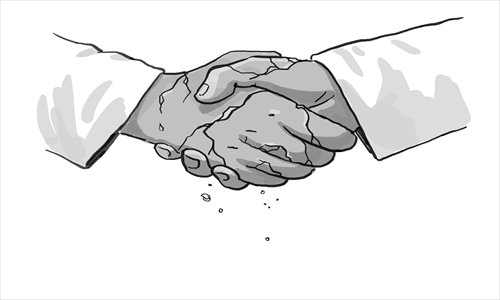Silence may be better than anger in East Asian discourse

Two of my friends, one German and one Canadian with a Jewish mother, met each other for the first time. They mentioned the Holocaust even before they really started to chat. Noticing my puzzled expression, the Canadian girl turned around and said, "That's usually what a German and a Jew do when they first met - we assure each other that we are both okay with that part of history."
That happened several years ago, but to someone living in East Asia like me, it still seems incredible to this day.
It is not a novel idea to revere the European postwar reconciliation as the exemplary solution for East Asian wrangles over historical leftover problems like public hatred and territorial disputes. But what sounds good on paper may not work in practice.
Is tolerance part of today's East Asian culture, as it is in modern Europe? In sharp contrast to the scene mentioned in the beginning of the article, East Asians, when they meet people from other parts of the region, prefer to avoid mentioning historical problems.
Such silence is already a demonstration of great tolerance by local definitions, because if they do start to talk about history, they may end up in an exchange of harsh words, each accusing the other of a wrong attitude in facing up to the past.
Liang Wendao, a well-known commentator on social and political affairs, once wrote that if no German politician had ever knelt down in Warsaw as Willy Brandt famously did, but instead German politicians visited a place enshrining Nazi criminals every single year, the Polish might have taken to the streets more frequently, gnashing their teeth and brandishing their fists.
I'm not sure if Liang's assumption is true. But the fact that East Asia falls way behind Europe in the process of historical reconciliation is probably predestined by differences in cultural genetics between the two continents.
Every year, numerous academic papers are produced, analyzing internal and external factors that have led to failures in East Asian reconciliation and offering advice on how to help the light of European compromise shine into East Asian impasse.
However, a detente seems infinitely remote, as long as the Chinese people stick to the idea that it's never too late for a virtuous man to take revenge even if it takes a decade and as long as the Japanese island mentality and culture of isolation fail to shift.
Similarly, ideas of transplanting the European reconciliation model to the West Bank and thus ending the Palestinian-Israeli conflict may be wishful. Scholars have pointed out the cultural roots: The tragedy is closely related to uncompromising characters on both sides, deeply influenced by their religious history.
Years of bloody war have made some on both sides clearly recognize that violence is no solution to historical grievances. But the vicious circle of revenge and anti-revenge seems endless.
Certainly, there are lessons that we can draw from the European reconciliation. For instance, how the international community, dominated by the US, treated defeated countries after World War II greatly influenced the settlement of historical issues.
Moreover, the possibility of enabling diversified historical narratives to get as close as possible to historical truth is the very first step in reaching a compromise. European cooperation on historical textbook especially offers lessons that merit attention.
With that said, it needs to be stressed that historical disputes cannot be simply solved by one side confessing and the other forgiving them. Historical leftover issues are more of a projection of practical, ongoing political and economic relationships between both sides.
Historical research, public discourse and other exchanges boosted by increasingly close economic ties can help people find consensus. But generally, it is too complex a project to be accomplished by relying on any model alone.
The author is an opinion editor with the Global Times. chenchenchen@globaltimes.com.cn
Counterpoint: Breaking shackles of past harm vital for lasting peace